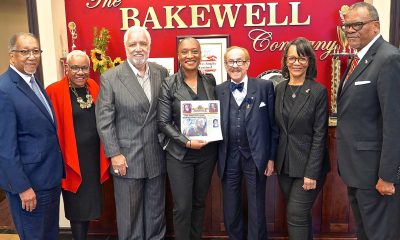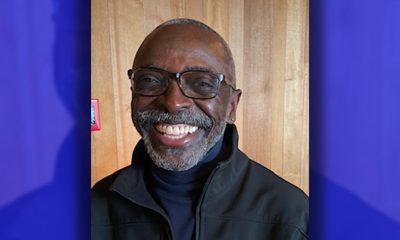Community
New Study: Racism Drives Black Homelessness
LOS ANGELES SENTINEL — Structural racism, discrimination, and unconscious bias drive an overrepresentation of Blacks experiencing homelessness.
By Charlene Muhammad
Structural racism, discrimination, and unconscious bias drive an overrepresentation of Blacks experiencing homelessness, according to a new report by the Los Angeles Homeless Services Authority.
“Report and Recommendations of the Ad Hoc Committee on Black People Experiencing Homelessness” was commissioned by Supervisor Mark Ridley-Thomas.
“We all know that the local data shows that in Los Angeles County, 1 out of every 10 residents are African American, and yet, 1 out of every 3 homeless persons are African American,” said Ridley-Thomas.
According to the report, it is an over-representation consistent demographically across the United States.
“The stark disparities that are the product of vicious and entrenched structural discrimination in all of its forms in our society: the justice system, our schools, our safety net, our workplaces and our halls of power,” he said.
He spoke to more than 100 L.A. County leaders homeless advocates, and activists who gathered for launch of the report at the California African American Museum on February 25.
Researchers found that discrimination in housing, employment, criminal justice, and child welfare policies have led to disproportionate numbers in Black homelessness. Lasting change requires a dismantling of institutions barriers across agencies and mainstream systems, they found.
The document cites 2017 Homeless Count estimates, which indicate that over 53 percent of Blacks experiencing homelessness were between the ages of 25 and 54. Individuals age 55 and older comprised 26 percent of the total population.
The report indicates, “The mounting affordable housing crisis across the state, especially in the Los Angeles region, paired with persistently low, stagnant, and declining wages, exacerbates homelessness and particularly for Black people.”
In addition, it went on, the plight of homelessness is made more complex and challenging by its link to incarceration. Embedding care and empathy in outreach and case management services, as well as policy and program design will effect change, according to researchers.
“While we make up only nine percent of the population, we make up nearly 40 percent of the homeless population, so giving some focus to what solutions could be to help people exit homelessness was paramount to this work,” said Jacqueline Waggoner, LAHSA Commissioner and chair of its 67-member Ad Hoc Committee on Black People Experiencing Homelessness.
She, along with Kelli Bernard, Chair, LAHSA Commission, and Peter Lynn, LAHSA Executive Director, extended sincere thanks to partners and community members, particularly individuals with lived experience of homelessness, for contributing to the study.
Sixty-seven recommendations out of the nine-month study include improving data collection, analysis and collaborative research to better understand and track issues affecting Blacks experiencing homelessness; and, advance racial equitable policies, programs, and funding across institutions.
After invocation by civil rights leader Reverend Cecil “Chip” Murray, L.A. Mayor Eric Garcetti, L.A. City Council Members Curren Priceand Marqueece Harris-Dawson, Reba Stevens, an Ad Hoc Committee member and advocate who has experienced homelessness, and Glenn Harris, president, Race Forward, which advocates for racial justice, also gave opening remarks.
Following the launch and a brief press availability, advocates and stakeholders held a symposium to highlight the data and next steps.
Price called the day exciting because of the call for action with documented proof of what’s needed to eradicate homelessness. He shared a personal testimony of how homelessness had touched his own family and many others in the same way.
Harris-Dawson, explained that the new study is follow up to a 2016 report on homelessness in South L.A., compiled by his office. He urged leaders and advocates to follow up to the data gathered in the new study with a scientific approach.
He used his time to sound a sobering note, saying it’s not the first time people have seen such a study or passed recommendations.
“We’ll go all the way, all the way, all the way back to the end of the Civil War. There as a recommendation about 40 acres and a mule, and we didn’t quite get that done,” said Harris-Dawson. He noted other landmark reports, bills and recommendations through the Civil Rights era to the early 90s that produced little change.
“…We should be here and rightfully celebrate this report and celebrate the work that is done and all that we’ve accomplished, but we must all hold our fee to the fire and this time, we get it done, and we get it done in the right way,” said Harris-Dawson.
This article originally appeared in the Los Angeles Sentinel.
Alameda County
DA Pamela Price Stands by Mom Who Lost Son to Gun Violence in Oakland
Last week, The Post published a photo showing Alameda County District Attorney Pamela Price with Carol Jones, whose son, Patrick DeMarco Scott, was gunned down by an unknown assailant in 2018.

Publisher’s note: Last week, The Post published a photo showing Alameda County District Attorney Pamela Price with Carol Jones, whose son, Patrick DeMarco Scott, was gunned down by an unknown assailant in 2018. The photo was too small for readers to see where the women were and what they were doing. Here we show Price and Jones as they complete a walk in memory of Scott. For more information and to contribute, please contact Carol Jones at 510-978-5517 at morefoundation.help@gmail.com. Courtesy photo.
City Government
Vallejo Welcomes Interim City Manager Beverli Marshall
At Tuesday night’s Council meeting, the Vallejo City Council appointed Beverli Marshall as the interim city manager. Her tenure in the City Manager’s Office began today, Wednesday, April 10. Mayor Robert McConnell praised Marshall’s extensive background, noting her “wide breadth of experience in many areas that will assist the City and its citizens in understanding the complexity of the many issues that must be solved” in Vallejo.

Special to The Post
At Tuesday night’s Council meeting, the Vallejo City Council appointed Beverli Marshall as the interim city manager. Her tenure in the City Manager’s Office began today, Wednesday, April 10.
Mayor Robert McConnell praised Marshall’s extensive background, noting her “wide breadth of experience in many areas that will assist the City and its citizens in understanding the complexity of the many issues that must be solved” in Vallejo.
Current City Manager Michael Malone, whose official departure is slated for April 18, expressed his well wishes. “I wish the City of Vallejo and Interim City Manager Marshall all the best in moving forward on the progress we’ve made to improve service to residents.” Malone expressed his hope that the staff and Council will work closely with ICM Marshall to “ensure success and prosperity for the City.”
According to the Vallejo Sun, Malone stepped into the role of interim city manager in 2021 and became permanent in 2022. Previously, Malone served as the city’s water director and decided to retire from city service e at the end of his contract which is April 18.
“I hope the excellent work of City staff will continue for years to come in Vallejo,” he said. “However, recent developments have led me to this decision to announce my retirement.”
When Malone was appointed, Vallejo was awash in scandals involving the housing division and the police department. A third of the city’s jobs went unfilled during most of his tenure, making for a rocky road for getting things done, the Vallejo Sun reported.
At last night’s council meeting, McConnell explained the selection process, highlighting the council’s confidence in achieving positive outcomes through a collaborative effort, and said this afternoon, “The Council is confident that by working closely together, positive results will be obtained.”
While the search for a permanent city manager is ongoing, an announcement is expected in the coming months.
On behalf of the City Council, Mayor McConnell extended gratitude to the staff, citizen groups, and recruitment firm.
“The Council wishes to thank the staff, the citizens’ group, and the recruitment firm for their diligent work and careful consideration for the selection of what is possibly the most important decision a Council can make on behalf of the betterment of our City,” McConnell said.
The Vallejo Sun contributed to this report.
City Government
Vallejo Community Members Appeal Major Use Permit for ELITE Charter School Expansion
Vallejo community members, former Solano County judge Paul Beeman and his wife Donna Beeman, filed an appeal against the approval of the Major Use Permit for the expansion of ELITE Public Schools into downtown less than two weeks after the Planning Commission approved the permit with a 6-1 vote.

By Magaly Muñoz
Vallejo community members, former Solano County judge Paul Beeman and his wife Donna Beeman, filed an appeal against the approval of the Major Use Permit for the expansion of ELITE Public Schools into downtown less than two weeks after the Planning Commission approved the permit with a 6-1 vote.
ELITE Charter School has been attempting to move into the downtown Vallejo area at 241-255 Georgia Street for two years, aiming to increase its capacity for high school students. However, a small group of residents and business owners, most notably the Beeman’s, have opposed the move.
The former county judge and his wife’s appeal alleges inaccuracies in the city’s staff report and presentation, and concerns about the project’s exemption from the California Environmental Quality Act (CEQA).
The Beeman’s stress that their opposition is not based on the charter or the people associated with it but solely on land use issues and potential impact on their business, which is located directly next to the proposed school location.
The couple have been vocal in their opposition to the expansion charter school with records of this going back to spring of last year, stating that the arrival of the 400 students in downtown will create a nuisance to those in the area.
During the Planning Commission meeting, Mr. Beeman asked Commissioner Cohen-Thompson to recuse herself from voting citing a possible conflict of interest because she had voted to approve the school’s expansion as trustee of the Solano County Board of Education. However, Cohen-Thompson and City Attorney Laura Zagaroli maintained that her positions did not create a conflict.
“I feel 100% that the attorney’s opinion is wrong,” Beeman told the Post.
He believes that Cohen-Thompson has a vested interest in upholding her earlier vote as a trustee and is advocating for people to ratify her opinion.
Cohen-Thompson declined to comment on the Post’s story and Zagaroli did not respond for comment.
The Beeman’s further argue that the school’s presence in the commercial district could deter future businesses, including those who sell alcohol due to proximity to schools.
According to Alcohol Beverage Control (ABC), the department can deny any retail license located within 600 feet of a school. Only one alcohol selling business is located within that range, which is Bambino’s Italian restaurant at 300 feet from the proposed location.
The project’s proponents argue that the school would not affect current or future liquor-selling establishments as long as they follow the ABC agency’s guidelines.
The Beeman’s also referenced Vallejo’s General Plan 2040, stating that the proposed expansion does not align with the plan’s revitalization efforts or arts and entertainment use. They argue that such a development should focus on vacant and underutilized areas, in accordance with the plan.
The proposed location, 241 Georgia Street aligns with this plan and is a two minute walk from the Vallejo Transit Center.
The General Plan emphasizes activating the downtown with, “Workers, residents, and students activate the downtown area seven days a week, providing a critical mass to support a ‘cafe culture’ and technology access, sparking innovation and entrepreneurship.”
City staff recommended exempting the project from CEQA, citing negligible impacts. However, Beeman raised concerns about increased foot traffic potentially exacerbating existing issues like theft and the lack of police presence downtown. He shared that he’s had a few encounters with kids running around his office building and disturbing his work.
Tara Beasley-Stansberry, a Planning Commissioner and owner of Noonie’s Place, told the Post that the arrival of students in downtown can mean not only opportunities for surrounding businesses, but can allow for students to find their first jobs and continue to give back to the community in revitalization efforts.
Beasley-Stansberry had advocated for the students at the March Commission meeting, sharing disappointment in the way that community members spoke negatively of the teens.
“To characterize these children as criminals before they’ve even graduated from high school, that’s when I had to really take a look and I was kind of lost as to where we were as a city and as a community to where I couldn’t understand how we were viewing these children,” Beasley-Stansberry told the Post.
She added that the commissioners who voted yes on the project location have to do what is right for the community and that the city’s purpose is not all about generating businesses.
ELITE CEO Dr. Ramona Bishop, told the Post that they have worked with the city and responded to all questions and concerns from the appropriate departments. She claimed ELITE has one of the fastest growing schools in the county with mostly Vallejo residents.
“We have motivated college-bound high school students who deserve this downtown location designed just for them,” Bishop said. “We look forward to occupying our new [location] in the fall of 2024 and ask the Vallejo City Council to uphold their Planning Commission vote without delay.”
The Vallejo City Council will make the final decision about the project location and Major Use Permit on April 23.
-

 Activism4 weeks ago
Activism4 weeks agoOakland Post: Week of March 27 – April 2, 2024
-

 #NNPA BlackPress4 weeks ago
#NNPA BlackPress4 weeks agoCOMMENTARY: D.C. Crime Bill Fails to Address Root Causes of Violence and Incarceration
-

 #NNPA BlackPress4 weeks ago
#NNPA BlackPress4 weeks agoFrom Raids to Revelations: The Dark Turn in Sean ‘Diddy’ Combs’ Saga
-

 #NNPA BlackPress4 weeks ago
#NNPA BlackPress4 weeks agoCOMMENTARY: Lady Day and The Lights!
-

 #NNPA BlackPress4 weeks ago
#NNPA BlackPress4 weeks agoMayor, City Council President React to May 31 Closing of Birmingham-Southern College
-

 #NNPA BlackPress4 weeks ago
#NNPA BlackPress4 weeks agoBaltimore Key Bridge Catastrophe: A City’s Heartbreak and a Nation’s Alarm
-

 #NNPA BlackPress4 weeks ago
#NNPA BlackPress4 weeks agoBaltimore’s Key Bridge Struck by Ship, Collapses into Water
-

 #NNPA BlackPress4 weeks ago
#NNPA BlackPress4 weeks agoBeloved Actor and Activist Louis Cameron Gossett Jr. Dies at 87



















































